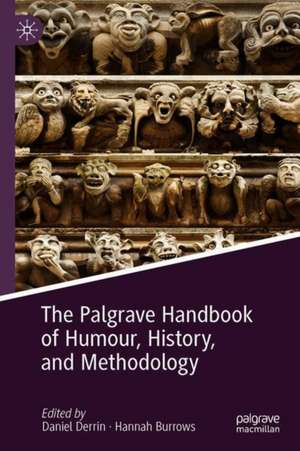The Palgrave Handbook of Humour, History, and Methodology
Editat de Daniel Derrin, Hannah Burrowsen Limba Engleză Hardback – 13 ian 2021
This handbook addresses the methodological problems and theoretical challenges that arise in attempting to understand and represent humour in specific historical contexts across cultural history. It explores problems involved in applying modern theories of humour to historically-distant contexts of humour and points to the importance of recognising the divergent assumptions made by different academic disciplines when approaching the topic. It explores problems of terminology, identification, classification, subjectivity of viewpoint, and the coherence of the object of study. It addresses specific theories, together with the needs of specific historical case-studies, as well as some of the challenges of presenting historical humour to contemporary audiences through translation and curation. In this way, the handbook aims to encourage a fresh exploration of methodological problems involved in studying the various significances both of the history of humour and of humour in history.
| Toate formatele și edițiile | Preț | Express |
|---|---|---|
| Paperback (1) | 1013.54 lei 6-8 săpt. | |
| Springer International Publishing – 13 ian 2022 | 1013.54 lei 6-8 săpt. | |
| Hardback (1) | 1018.76 lei 6-8 săpt. | |
| Springer International Publishing – 13 ian 2021 | 1018.76 lei 6-8 săpt. |
Preț: 1018.76 lei
Preț vechi: 1242.39 lei
-18% Nou
Puncte Express: 1528
Preț estimativ în valută:
194.94€ • 201.11$ • 162.68£
194.94€ • 201.11$ • 162.68£
Carte tipărită la comandă
Livrare economică 27 martie-10 aprilie
Preluare comenzi: 021 569.72.76
Specificații
ISBN-13: 9783030566456
ISBN-10: 3030566455
Pagini: 526
Ilustrații: XXV, 526 p. 68 illus., 12 illus. in color.
Dimensiuni: 155 x 235 mm
Greutate: 0.99 kg
Ediția:1st ed. 2020
Editura: Springer International Publishing
Colecția Palgrave Macmillan
Locul publicării:Cham, Switzerland
ISBN-10: 3030566455
Pagini: 526
Ilustrații: XXV, 526 p. 68 illus., 12 illus. in color.
Dimensiuni: 155 x 235 mm
Greutate: 0.99 kg
Ediția:1st ed. 2020
Editura: Springer International Publishing
Colecția Palgrave Macmillan
Locul publicării:Cham, Switzerland
Cuprins
Part I: Preliminaries: terms and theories
1.Introduction – Daniel Derrin
2.The Study of Past Humour: Historicity and the limits of Method- Conal Condren
3.No Sense of Humour? ‘Humour’ Words in Old Norse- Hannah Burrows
4.Rewriting Laughter in Early Modern Europe- Lucy Rayfield5.The Humour of Humours: Comedy Theory and Eighteenth-Century Histories of Emotions- Rebecca Tierney-Hynes
6.Bergson’s Theory of the Comic and its Applicability to Sixteenth-Century Japanese Comedy- Jessica Milner Davis
7.Comic Character and Counter-violation: Critiquing Benign Violation Theory- Daniel Derrin
8.Humour and Religion: New Directions?- Richard A. Gardner Part II: Case studies
9.Visual Humour on Greek Vases (550-350 BC): Three Approaches to the Ambivalence of Ugliness in Popular Culture- Alexandre Mitchell
10. Approaching Jokes and Jestbooks in Premodern China- Giulia Baccini
11.Testing the Limits of Pirandello’s Umorismo: a Case Study Based on Xiaolin Guangji- Antonio Leggieri
12.The Monsters that Laugh Back: Humour as a Rhetorical Apophasis in Medieval Monstrology- Rafał Borysławski
13.Medieval Jokes in Serious Contexts: Speaking Humour to Power- Martha Bayless
14. ‘Lightness and Maistrye’: Herod, Humour and Temptation in Early English Drama- Jamie Beckett
15.Embodied Laughter: Rabelais and the Medical Humanities- Alison Williams
16.Naïve Parody in Rabelais- John Parkin
17.‘By God’s Arse’: Genre, Humour and Religion in William Wager’s Moral Interludes- Lieke Stelling
18.Romantic Irony: Problems of Interpretation in Schlegel and Carlyle- Giles Whiteley
19.Unlocking Verbal-Visual Puns in Late-Nineteenth-Century Japanese Cartoons- Ronald Stewart
20.Popular Humour in Nordic Jesting Songs of the Nineteenth and Twentieth Centuries: Danish Recordings of Oral Song Tradition- Lene Halskov Hansen
21.Spanish Flu: The First Modern Case of Viral Humour?- Nikita Lobanov
Part III: Humour of the Past in the Present
22.Translating Humour in The Song of Roland- John DuVal
23.Intercultural and Interartistic Transfers of Shandean Humour in the Twentieth and Twenty-first Centuries- Yen-Mai Tran-Gervat
24.The Scholars, Chronique indiscrète or Neoficial’naja istorija? The challenge of Translating Eighteenth-century Chinese Irony and Grotesque for Contemporary Western Audiences- Anna Di Toro
25.Putting Humour on Display- Laurence Grove
26.Building The Old Joke Archive- Bob Nicholson and Mark Hall
Notă biografică
Daniel Derrin is Honorary Research Fellow in the Department of English Studies at Durham University, UK. He has held research and teaching fellowships in Australia and the UK and has published widely on early modern literature and on humour.
Hannah Burrows is Senior Lecturer in Scandinavian Studies at the University of Aberdeen, UK. She has edited and translated the Old Norse riddle corpus for the Skaldic Poetry of the Scandinavian Middle Ages series, and her publications include articles on the relationship between the riddles and Norse mythological poetry.
Textul de pe ultima copertă
This handbook addresses the methodological problems and theoretical challenges that arise in attempting to understand and represent humour in specific historical contexts across cultural history. It explores problems involved in applying modern theories of humour to historically-distant contexts of humour and points to the importance of recognising the divergent assumptions made by different academic disciplines when approaching the topic. It explores problems of terminology, identification, classification, subjectivity of viewpoint, and the coherence of the object of study. It addresses specific theories, together with the needs of specific historical case-studies, as well as some of the challenges of presenting historical humour to contemporary audiences through translation and curation. In this way, the handbook aims to encourage a fresh exploration of methodological problems involved in studying the various significances both of the history of humour and of humour in history.
Caracteristici
Provides a comprehensive focus on the limits of the methodologies used by scholars to address 'humour' across cultural history
Maps and elucidates the methodological problems raised by historical case studies
Highlights the theoretical challenges involved in presenting historical humour to contemporary audiences
Maps and elucidates the methodological problems raised by historical case studies
Highlights the theoretical challenges involved in presenting historical humour to contemporary audiences
